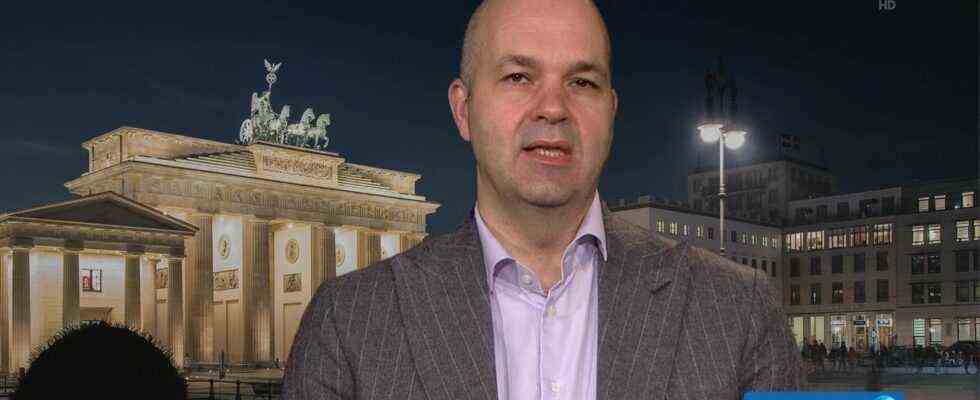Status: 10/29/2021 02:03 a.m.
Consumer prices in Germany rose by 4.5 percent in October compared to the same month last year. In an interview with the daily topics DIW boss Fratzschner warned of a wage-price spiral and explained what would lead to higher prices.
The rise in consumer prices accelerated further in October. Driven by high energy prices and also due to the special effects of the Corona crisis, the inflation rate rose to an expected 4.5 percent, according to the Federal Statistical Office. This means that inflation is well above the European Central Bank’s target of two percent – despite this, the ECB is sticking to its loose monetary policy for the time being.
An inflation rate of 4.5 percent compared to the same month last year is the highest level in 28 years. The rise in energy prices was particularly sharp, increasing by 18.6 percent compared to October 2020. According to the Federal Office, food prices rose by 4.4 percent within a year, while services rose by 2.4 percent. Compared to September, consumer prices rose by 0.5 percent in October.
DIW boss warns of wage-price spiral
In the daily topics the President of the German Institute for Economic Research tried to classify the rising inflation. He is also worried, says Marcel Fratzscher, but also warned: “In the past few years, the price trend has been too weak. So we are now seeing a certain catch-up effect, including in energy prices and food prices.”
Marcel Fratzscher, President DIW, on concerns about inflation and national debt
Topics of the day 10:15 p.m., 10/28/2021
When it comes to price developments in the coming years, expectations are crucial. There is a risk of a wage-price spiral if employers expect inflation rates of 4 to 5 percent and wages are adjusted accordingly. “You have to be very careful here,” said Fratzscher, who also said: “At the moment this effect is not yet visible.” The ECB must be careful that inflation does not become too high.
One problem with rising inflation is that it is very unevenly distributed among consumers. When gasoline, food and housing become significantly more expensive, this particularly affects people with lower incomes. This distribution inequality worries him very much, because “it increases social polarization.”
Fighting climate change will further increase energy prices
Not only the central bank is in demand, but also politics, so Fratzscher. If they introduce a CO2 price in the fight against climate change, which he thinks is right, “then we also have to help the people who are particularly badly affected by it.”
Fear of High Prices – Isn’t the ECB doing its job?
Klaus-Rainer Jackisch, HR, Daily Topics 10:15 p.m., October 28, 2021
For many Germans, climate protection will mean that fossil fuels will continue to become more expensive. Because: The federal subsidies of 70 billion euros for fossil fuels must be reduced in the coming years. This means that energy prices will continue to rise in the years to come. In the case of inflation values, one must therefore look very carefully at the causes.
The Federal Statistical Office names a number of reasons for price increases
According to the Federal Statistical Office, the currently high inflation rates have “a number of reasons”: On the one hand, this includes the so-called base effect due to low prices, for example for oil in the Corona year 2020. This effect means that the change compared to the same month last year is comparatively high. In addition, in 2020, when inflation for the year as a whole was still as low as it was in the financial and economic crisis in 2009 at 0.5 percent, VAT was temporarily lowered in order to stimulate consumption, which had collapsed during the pandemic.
Added to this are the introduction of CO2 pricing since January 2021 and, according to the Federal Office, “crisis-related effects such as the significant price increases on the upstream economic levels”. In view of delivery bottlenecks, there had recently been significant price increases in material procurement across various branches of the economy. However, “for the time being only partially and weakened” this is reflected in the inflation rate, explained the statisticians.
The rate of inflation in Germany had already reached 3.8 percent in July, the highest level in decades, then 3.9 percent in August and 4.1 percent in September. In the eurozone, it was 3.4 percent in September, its highest level since 2008.
ECB keeps key interest rate at zero percent
In view of this development, the focus has recently increasingly shifted to the ECB’s loose monetary policy, which aims to stimulate the economy in the euro zone with its historically low interest rates and thus cheap capital. At its meeting on Thursday, the Council of the ECB left the key interest rates unchanged for the time being, as did the Pandemic Emergency Purchase Program (PEPP) for the purchase of government and corporate bonds.
ECB President Christine Lagarde also emphasized that the phase of high inflation “will last longer than originally expected”. In the course of next year, however, it will decline again, she predicted. Lagarde also emphasized that the central bank was ready to sharpen its monetary policy instruments to ensure that inflation “stabilizes in the medium term at the target of 2.0 percent”.

